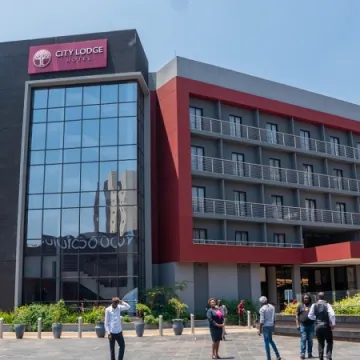Hospitality sector held hostage by Visa hurdles and insecurity — Experts

Also in the list of emerging challenges is the oversupply of hotel rooms in the hospitality industry. In Nairobi for instance, players in the hotel business experienced a surge in room supply, with over 2,000 new hotel rooms opening doors in just 18 months.
VISA complexities and security concerns have been singled out as some of the biggest challenges chocking growth in Kenya and Africa's thriving hospitality industry despite heavy investments in the sector.
According to hospitality sector experts who are preparing to meet at the upcoming East Africa Property Investment (EAPI) Summit in Nairobi, supply chain woes and regulations still continue to slow growth in the industry.
The 12th EAPI annual summit, which will be held in Nairobi on May 7-8, 2025, is poised to attract over 450 investors from across the world, developers, and real estate professionals keen on exploring emerging opportunities and challenges in the industry across Kenya, Tanzania (including Zanzibar), Uganda, Rwanda, and Ethiopia.
“Kenya’s hospitality industry, while exhibiting resilience and growth, faces several challenges such as security concerns, regulatory hurdles, supply chain disruptions, and human resource challenges. The high cost of financing and inflation-driven operational costs further strain businesses,” says Aleph Hospitality’s Haddad.
Aleph Hospitality is an independent hotel management firm, which has presence in the Middle East and Africa.
He adds: “For Kenya to solidify its position as a premier global investment destination, collaboration with government and private sectors is key to improving infrastructure and security. Streamlining land acquisition and development approvals will cut delays and costs, making business easier. Diversifying suppliers can ease supply chain issues while investing in talent retention will boost efficiency and service quality.”
VISA complexities
Additionally, Visa complexities, continues to manifest as a huge hurdle, further constraining growth on Africa's hospitality industry. This challenge has the potential to stunt the growth of Kenya’s luxury hospitality sector, experts have warned.
Across economies in Africa, Visa complexities are marked by limited visa-free travel opportunities, with only a small percentage of countries offering such options to their peers. Quite often, the process of obtaining travel VISAs is often expensive and bureaucratic, requiring lengthy procedures and embassy visits.
Experts also note that significant disparity in passport strength across economies in Africa, with some countries enjoying extensive visa-free access while others chocking under severe restrictions.
What's more, political instability and security concerns such as those gripping countries in the great lakes region further complicate mobility for citizens and tourists alike, experts point out.
“There are a number of issues facing the industry at present. The easiest of these issues to overcome would be the simplification of the visa/entry process to tangibly encourage visitors," says Mark Dunford, CEO of Knight Frank Kenya.
Oversupply of hotel rooms
Also in the list of emerging challenges is the oversupply of hotel rooms in the hospitality industry. In Nairobi for instance, players in the hotel business are grappling with heightened competition due to oversupply of rooms.
According to Fiona Craw, Vice President of the Hotels & Hospitality Group at JLL Africa, Nairobi recently experienced a surge in room supply, with over 2,000 new hotel rooms opening doors for business in just 18 months.
“As a result, market performance is expected to face downward pressure throughout 2025 as the sector works to absorb this new inventory,” explained Craw.
Daniel Trappler, Senior Director of Development for Sub-Sahara Africa at Radisson Hotel Group, partly agrees with Craw about the oversupply of hotel rooms, in some urban Nairobi areas.
Trappler says, however, that there are certain nodes that represent pockets of value that are not yet adequately supplied, and with the correct brand could certainly capture market share in Nairobi and lure guests easily, especially with brands that RHG does not yet have operational in the city.
Investors that have access to the right capital are therefore in a good position to leverage from this market opportunity. Trappler adds that both the entry level luxury brand Radisson Collection, and the lifestyle upscale brand Radisson RED, would serve owners with strong returns if built at the right locations.
Despite the oversupply of hotel rooms and intense competition, there are pockets of growth and excellence. Marriott International, which has a presence in Kenya as it operates city hotels in Nairobi and safari lodges in the Masai Mara, says it is seeing strong growth in its business.
The potential in hospitality industry
Despite these challenges, the industry experts acknowledge that a combination of rising middle class, and increase in international visitors in Kenya are powering expansion in Kenya's hospitality sector.
The growth is also attributable to economic stability and Kenya's unique mix of natural beauty, location within the continent and an array of supportive government policies.
Industry experts note that Kenya, Tanzania (including Zanzibar), Uganda, Rwanda, and Ethiopia economies are showing promising signs of recovery and political stabilization, offering great potential for investments.
“Kenya presents a great opportunity for hospitality investment due to its unique combination of untapped potential, economic stability, strategic location, and government incentives," said Bani Haddad, Founder and Managing Director of Aleph Hospitality.
"Add to that a 35 percent increase in international visitors and a growing middle class with disposable income. It’s clear that the demand for quality hospitality services will continue to rise, offering promising opportunities for local and international investors," he noted.
According to Dunford of Knight Frank Kenya, improved connectivity through airports is equally playing a critical role in sustaining growth and the influx of tourists into East Africa's largest economy, too.
“Jomo Kenyatta International Airport must remain a hub for Sub-Saharan Africa region with additional long-haul flights to support along with further investment in the other local airports,” says Dunford.
Fiona Craw of JLL Africa notes that Kenya’s hospitality sector attracts significant investment, particularly in Nairobi and the Masai Mara area.
This growth, Craw notes, is powered by robust demand for services across sectors including corporate, leisure, MICE (Meetings, Incentives, Conferences, and Exhibitions), and even the government.
Nairobi’s position as a key economic and transit hub in Africa, coupled with Masai Mara’s global reputation as a premier safari destination, further fuels this investment trend.
Craw says the ongoing infrastructure development in Kenya, especially in Nairobi, is enhancing accessibility and supporting the country’s efforts to establish itself as a leading MICE tourism destination. “This strategic positioning is driving demand for high-quality accommodation and state-of-the-art meeting facilities.”





